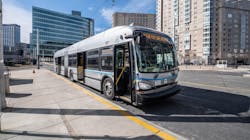MBTA progresses commitment to more sustainable future with zero-emission bus contract, RFQ for renewable electricity
The Massachusetts Bay Transportation Authority (MBTA) Board of Directors took action to advance the authority’s move toward a more sustainable future with the awarding of an electric bus contract, as well as approval of a Request for Qualifications (RFQ) for a three-to-five-year renewable energy contract.
80 battery electric buses
MBTA awarded a $119 million contract to New Flyer of America Inc. for 80 40-foot battery electric buses. The base order includes 48 conventional electric buses with 32 street-side boarding capable buses. The contract includes an option for up to 380 additional electric buses.
The electric buses will replace MBTA’s New Flyer Emissions Controlled Diesel fleet and its retired fleet of Neoplan Electric Trolley Buses. The authority will receive delivery of 10 pre-production buses in the summer of 2024, with the delivery schedule for the remaining buses to be coordinated with the opening of the North Cambridge bus facility and Quincy bus facility. MBTA’s North Cambridge facility will be outfitted with battery electric bus chargers and a control system to accommodate 32 electric buses. The new Quincy facility will provide inside storage and maintenance bays to accommodate up to 120 electric buses in a new, all-indoor, modern garage.
“This contract demonstrates MBTA’s commitment toward reducing its emissions and is another step toward reaching our climate goals,” said MBTA General Manager and CEO Philip Eng. “In addition to reducing the authority’s greenhouse gas emissions, these 40-foot battery electric buses have many amenities to enhance our riders’ experience, like flip-up seats, accessibility features and dual-sided passenger information screens. I would like to thank the MBTA Board of Directors for approving this contract award, our Vehicle Engineering and Vehicle Procurement teams for their hard work on this project, our Bus Modernization team for their diligent work in supporting MBTA’s fleet and facilities transition to [battery electric buses] and our Finance team for their work in securing federal funding for this procurement last summer.”
RFQ – renewable electricity
The MBTA is the largest consumer of electricity in the commonwealth and the board’s approval of an RFQ for a renewable energy supplier upgrades the MBTA’s commitment to renewables since its last energy contract in 2021. The RFQ will be issued on Aug. 4, with responses due Aug. 21 and the purchase to occur on Sept. 13.
The RFQ is for an up to $120-million, three-to-five-year wholesale renewable electricity supply contract. The MBTA explains it makes fiscal sense to procure its electricity supply in advance at a fixed price. The practice provides the authority with budget stability and predictability in an energy market that can frequently fluctuate.
“This critical procurement in fully renewable energy, further highlighted by our recommendation to purchase 30 percent Massachusetts Renewable Energy Credits, underscores the MBTA’s commitment to electricity produced from renewable energy sources while being fiscally responsible, understanding our energy needs will continue to grow in the future,” said Eng. “We’re looking forward to receiving responses to this RFQ, and I thank the dedicated members of our Sustainability and Finance teams for working so diligently to build out this procurement.”

Mischa Wanek-Libman | Group Editorial Director
Mischa Wanek-Libman is director of communications with Transdev North America. She has more than 20 years of experience working in the transportation industry covering construction projects, engineering challenges, transit and rail operations and best practices.
Wanek-Libman has held top editorial positions at freight rail and public transportation business-to-business publications including as editor-in-chief and editorial director of Mass Transit from 2018-2024. She has been recognized for editorial excellence through her individual work, as well as for collaborative content.
She is an active member of the American Public Transportation Association's Marketing and Communications Committee and served 14 years as a Board Observer on the National Railroad Construction and Maintenance Association (NRC) Board of Directors.
She is a graduate of Drake University in Des Moines, Iowa, where she earned a Bachelor of Arts degree in Journalism and Mass Communication.




